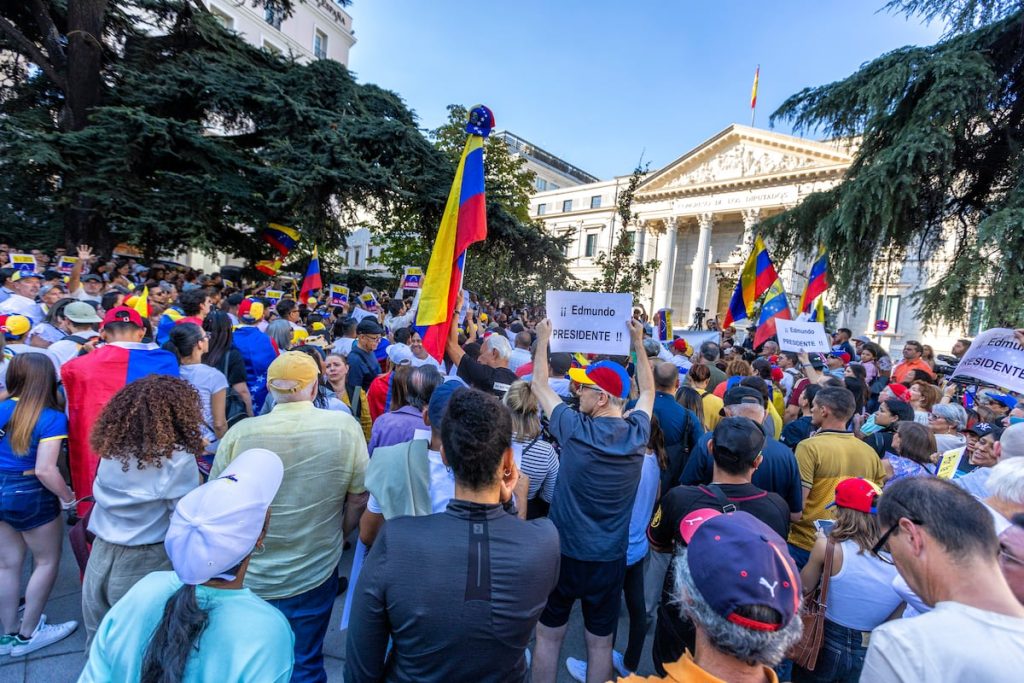Hundreds of Venezuelan opposition supporters gathered in Madrid on Tuesday afternoon, three days after Edmundo González arrived in Spain, to claim victory in the elections last July. Organized by opposition leader María Corina Machado, González’s supporters held a vigil in front of the Congress of Deputies while the lower house discussed a non-binding motion put forward by the Popular Party to pressure the government of Pedro Sánchez to recognize González as the country’s elected president. The vote on the initiative, which is expected to pass after the Basque Nationalist Party announced its support, will take place on Wednesday. “We will remain vigilant while the Congress of Deputies discusses the resolution recognizing Edmundo as president,” the organizers announced from the platform. The concentration featured speeches from former Caracas mayor Antonio Ledezma, opposition leader Leopoldo López, and Carolina González, Edmundo González’s daughter, who delivered a brief message from her father to the demonstrators.
Ledezma arrived at Plaza de las Cortes accompanied by the spokesperson for the Popular Party in Congress, Cayetana Álvarez de Toledo. The former mayor provided an overview of the debate on the non-binding motion. In his opinion, based on the statements made by deputies, it can be concluded that tomorrow the Plenary will “recognize Edmundo González as president.” However, the final decision on recognizing González lies with the government, not the Congress. Ledezma thanked the Popular Party, the Basque Nationalist Party, Coalición Canaria, and Vox for their support. Opposition leader Leopoldo López emphasized the need not only to “disavow the results” with which the Venezuelan National Electoral Council declared President Nicolás Maduro the winner, but also to “recognize the results of July 28th that declared Edmundo González the winner of that election.” López expressed confidence that González will be able to assume office on January 10.
According to the organizers of the march, recognizing Edmundo González is “very important.” Most of the slogans and banners carried this demand, along with the motto “For the freedom of Venezuela.” Corina Gatti, coordinator of the “Venezuela Con” group and coordinator of the “Come Venezuela” party in Madrid, stated that the approval of the motion “is very important,” and they hope Spain will lead the recognition of Edmundo González throughout the European Union. The event concluded around eight o’clock in the evening, with the protesters singing the Venezuelan national anthem, accompanied by Héctor García, an opera singer who was present at the gathering.
In conclusion, the demonstration in Madrid by Venezuelan opposition supporters aimed to pressure the Spanish government to recognize Edmundo González as the elected president of Venezuela. Led by opposition leader María Corina Machado, the supporters held a vigil outside the Congress of Deputies while the non-binding motion calling for González’s recognition was being discussed. The presence of prominent figures like former Caracas mayor Antonio Ledezma and opposition leader Leopoldo López added weight to the event, with López stressing the importance of recognizing the election results that declared González as the winner. The organizers highlighted the significance of Spain taking the lead in recognizing González within the European Union.
Overall, the demonstration was marked by a strong sense of solidarity and determination among the Venezuelan opposition supporters, with calls for freedom and democracy in their home country being a central theme. The support from Spanish political parties and the upcoming vote on the motion signaling potential recognition of González as president added to the optimism and hope of the demonstrators. The event concluded with the singing of the Venezuelan national anthem, symbolizing the unity and resilience of the Venezuelan people in their fight for democracy. The outcome of the vote on recognizing González will have significant implications for the ongoing political crisis in Venezuela as well as the international community’s response to the situation.















